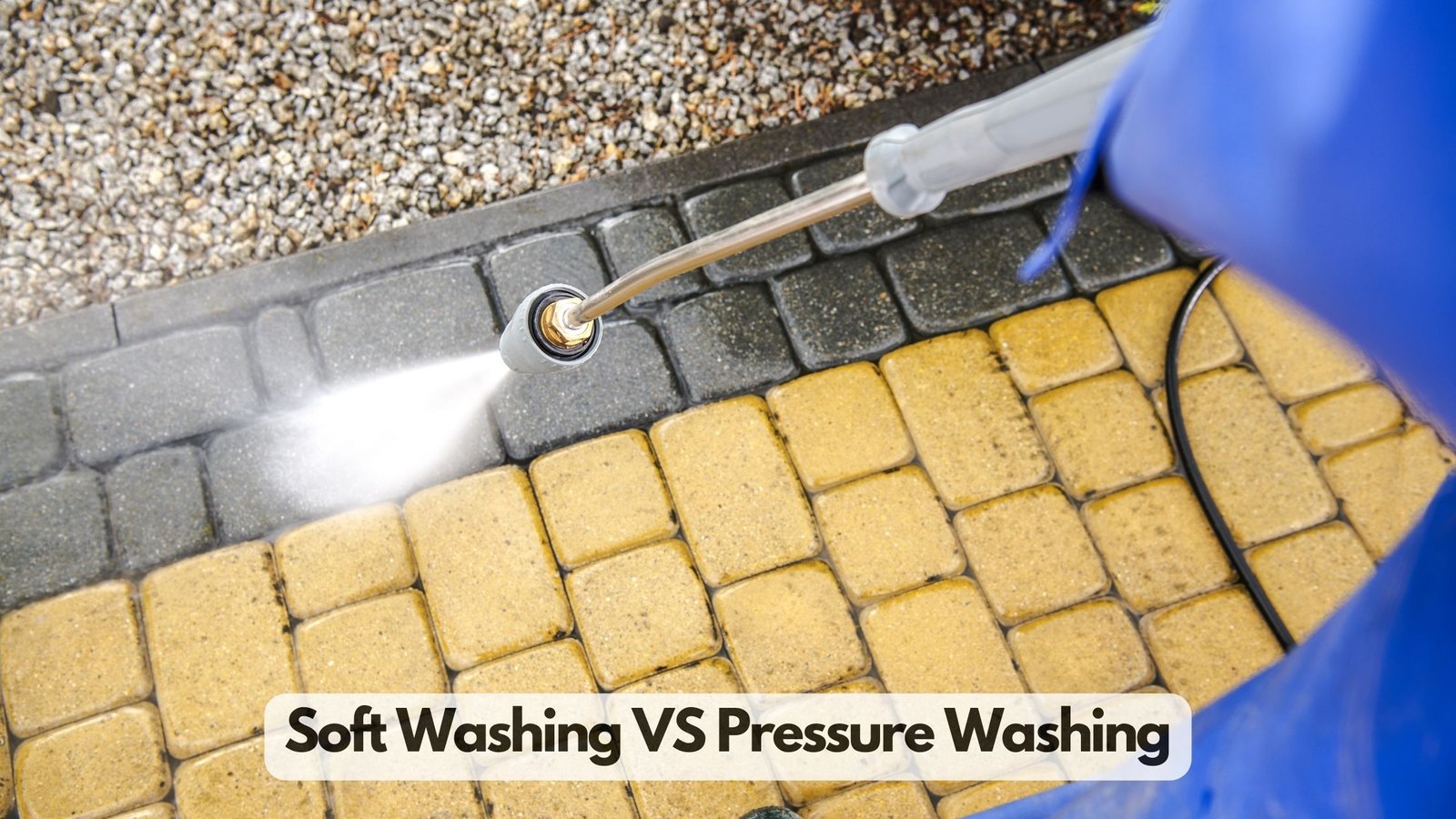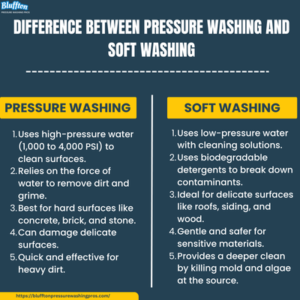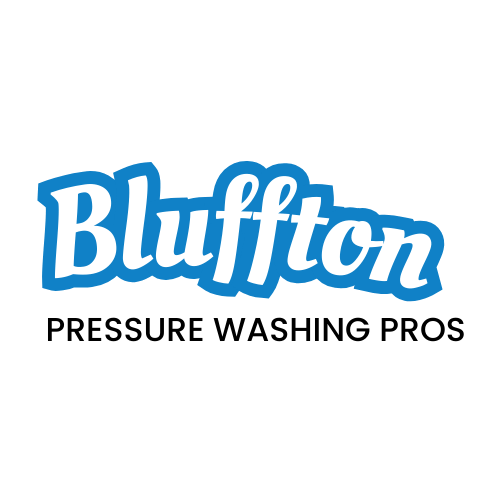
Keeping your home’s exterior clean is important for its appearance and longevity. Two popular methods for cleaning outdoor surfaces are soft washing and pressure washing.
Both methods have pros and cons and are best suited for different surfaces and stains. Soft washing uses low-pressure water mixed with cleaning solutions to clean delicate surfaces.
On the other hand, pressure washing uses high-pressure water to clean surfaces.
In case you need a professional pressure washing service or soft washing service in Bluffton, South Carolina you can give us a call at – 877-749-6437.
The guide that we created below is to help you understand the key differences between pressure washing and soft washing and choose the right one for your cleaning needs to save time and money.
What is Soft Washing?
In the soft washing method, low-pressure water and special cleaning solutions is used to remove dirt, mold, algae, and other contaminants from surfaces. Its pressure ranges from 1000 to 1500 PSI.
It is gentle on delicate materials like roof shingles, siding, wood, and vinyl. Instead of relying on high-pressure water, soft washing applies a biodegradable detergent that breaks down dirt and grime.
Soft washing is ideal for cleaning painted surfaces, roofs, decks, and fences that can be damaged using the pressure washer.
Also Read:
Pressure Washer Won’t Start? Try These Tips
What Is Pressure Washing?
Pressure washing uses high-pressure water to remove dirt, grime, mold, and stains from different types of surfaces. It is ideal for hard surfaces like concrete driveways, sidewalks, brick walls, and stone patios.
The high-pressure water, ranging from 1300 to 4,000 PSI, blasts away tough dirt and debris. It is effective for cleaning heavily soiled areas and is commonly used for outdoor surfaces that can withstand the force, such as unpainted concrete and brick.
With a pressure washer, you don’t need to use harsh chemicals to restore the appearance of exterior surfaces.
Difference Between Pressure Washing VS Soft Washing

Pros and Cons Of Soft Washing and Pressure Washing?
There are advantages and disadvantages of both pressure washing and soft washing. We share some pros and cons of both.
Pros of Soft Washing:
- Gentle Cleaning: Sof wash is Ideal for cleaning delicate surfaces like roof shingles, wood, and vinyl siding.
- Effective: It is very effective in removing mold, algae, and dirt using biodegradable detergents.
- Safe for Surfaces: Soft washing is safe for many different surfaces, which can be easily damaged by high-pressure washing.
- Long-Lasting: The result of soft washing is long-term as it kills mold and algae from the source, preventing frequent regrowth.
Cons of Soft Washing:
- Slower Process: Soft washing is slower and takes more time than pressure washing.
- Chemical Use: This relies mainly on cleaning chemical solutions, which may not be suitable for all environments.
- Multiple Applications: To remove stubborn stains, you must undergo multiple treatments to make them disappear completely.
Pros of Pressure Washing:
- Effective Cleaning: The high-pressure water can wash away even the toughest dirt, grime, and stains from exterior surfaces.
- Fast: This method can clean large areas quickly, saving time compared to manual cleaning.
- Flexible: Pressure washing can be used on a variety of hard surfaces, such as driveways, sidewalks, patios, decks, etc.
- Eco-friendly Option: Compared to soft washing, pressure washing is more eco-friendly as it only uses water to clean the surfaces, making it more environmentally friendly.
Cons of Pressure Washing:
- Chances of Damage: High pressure can damage delicate surfaces, such as wood, paint, or shingles, if not used carefully.
- Shorter Clean Duration: Surfaces may get dirty again relatively quickly, especially in damp or shaded areas prone to mold and algae.
- Water Usage: For large cleaning projects this method requires a lot of water.
- Risk of Injury: If you don’t know how to use or handle a pressure washer properly then the powerful water jet can cause injuries to the person using it.
Can Pressure Wash and Soft Wash Be Used Together?
Yes, power and soft washing can be used together. Professionals often start with power washing for hard surfaces like driveways and sidewalks to remove tough grime. Then, they switch to soft washing for delicate surfaces like roofs and siding to avoid damage. This combination ensures all areas are cleaned effectively without harming sensitive materials.
When to Avoid Using Soft Washing
1. Multiple Leaks: Soft washing may worsen leaks, causing water damage inside the home.
2. Rotting Wood: Any washing could exacerbate water damage.
3. Damaged or Missing Shingles
4. Extensive Moss and Algae Growth: Indicates severe underlying problems and soft washing could dislodge shingles.
5. Old Roof: Nearing or beyond its lifespan, typically 20-25 years for asphalt shingles.
6. Bald Spots on Shingles: Shows significant damage, making this method unsuitable.
7. Cracked or Blistered Shingles: Signs of aging, and washing could worsen these areas.
8. Extensive Granule Loss: Indicates the roof is nearing the end of its lifespan; washing can dislodge more granules.
9. Severe Weathering: Weakens the roof structure, making it unsuitable for soft washing.
10. Sagging Roof Deck: Indicates severe water damage; washing could compromise safety.
Why Shouldn’t I DIY Soft Wash or Pressure Wash?
- Risk of Damage: Incorrect use can damage surfaces, like wood decks or siding.
- Safety Concerns: High-pressure water can cause injuries if not handled properly.
- Proper Equipment: Professionals have the latest and most advanced cleaning equipment that ensures effective cleaning.
- Knowledge and Experience: Professionals have more than a decade of experience in this field which makes them highly knowledgeable in cleaning different types of surfaces effectively. Experts know the right techniques and cleaning solutions for different surfaces.
- Time-Consuming: DIY can take much longer and may not achieve professional results.
- Environmental Risks: Improper handling of cleaning solutions can harm plants and the environment.
Hope, this article helped you understand the difference between soft washing vs pressure washing.
